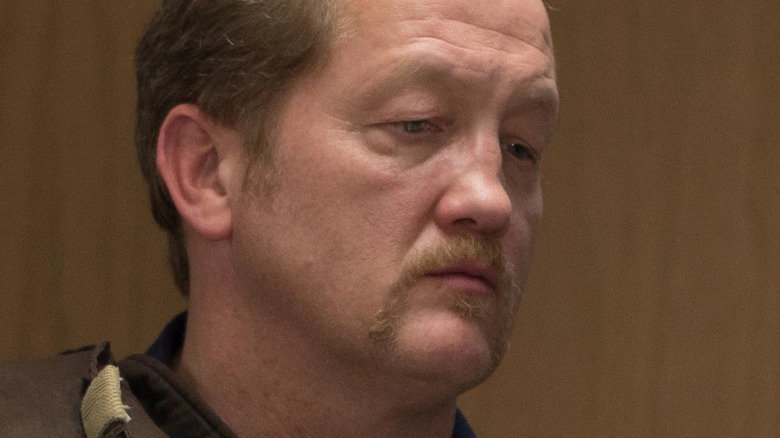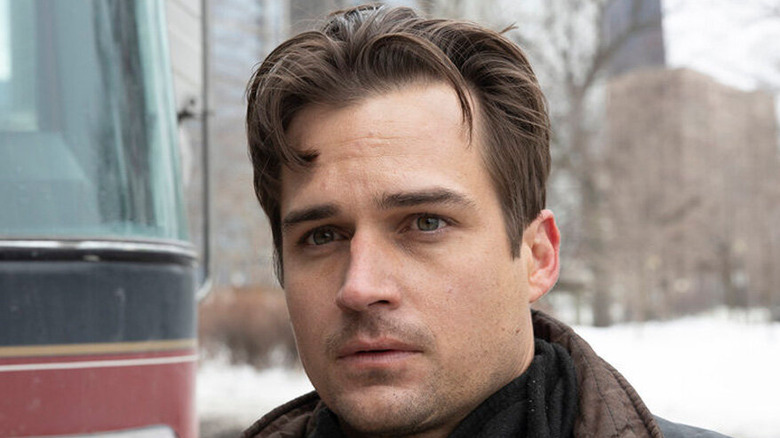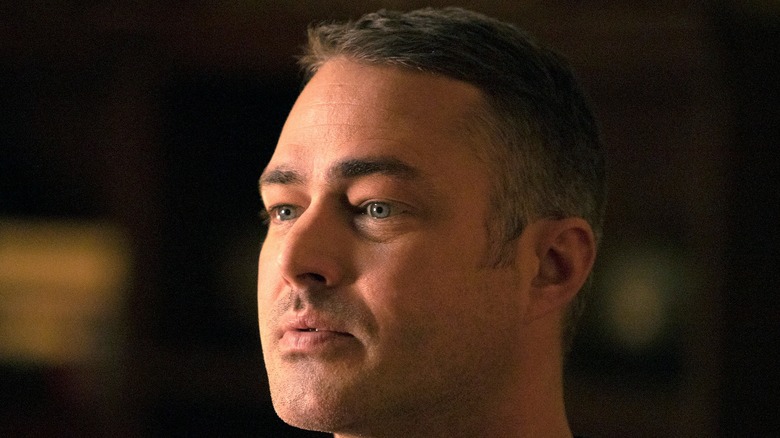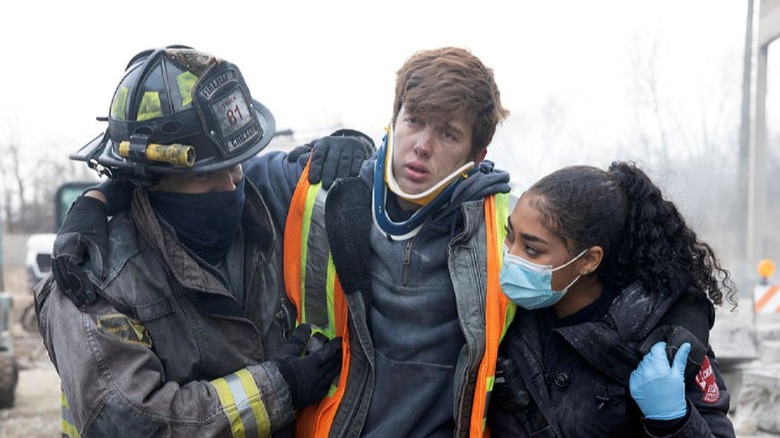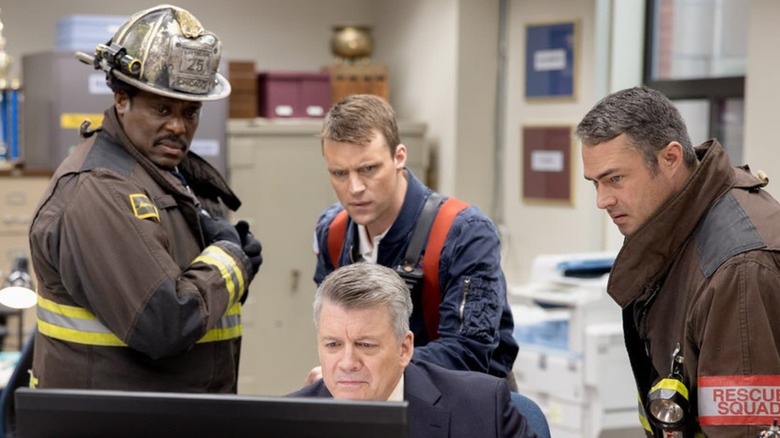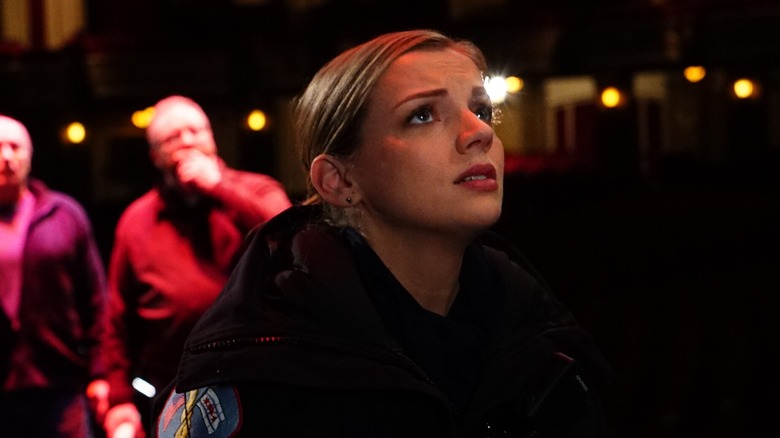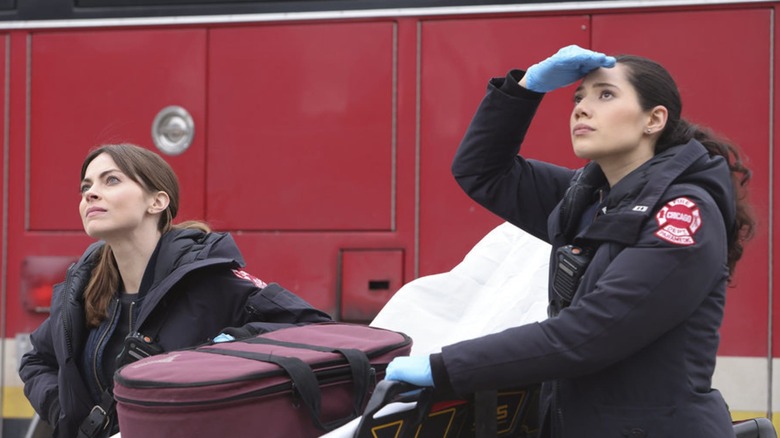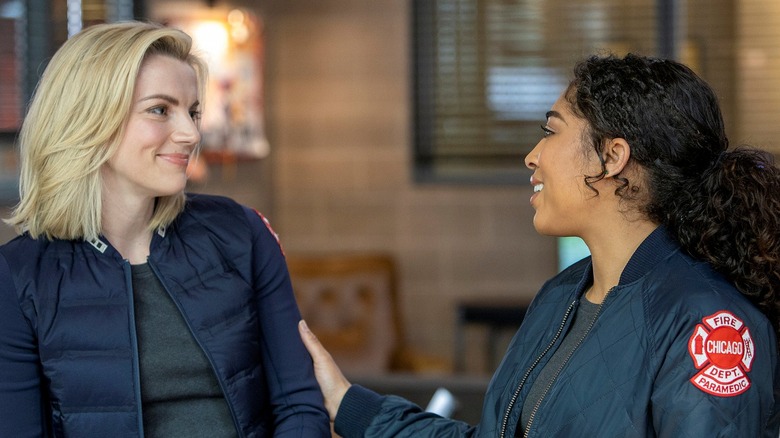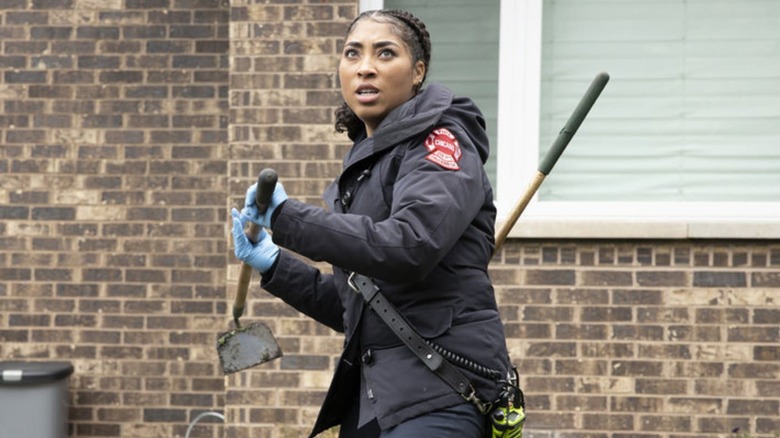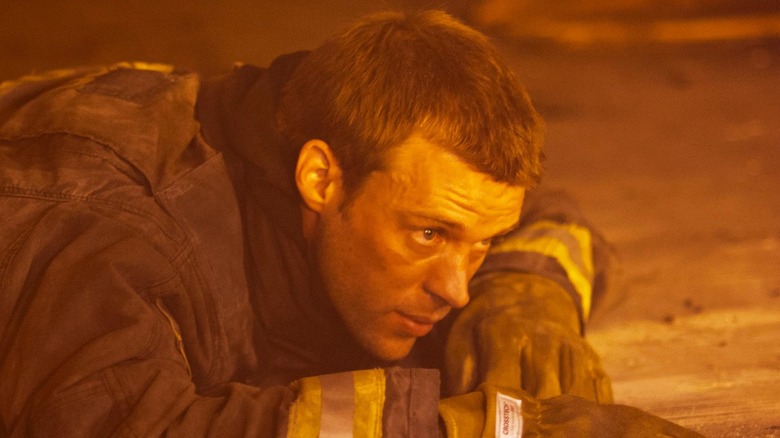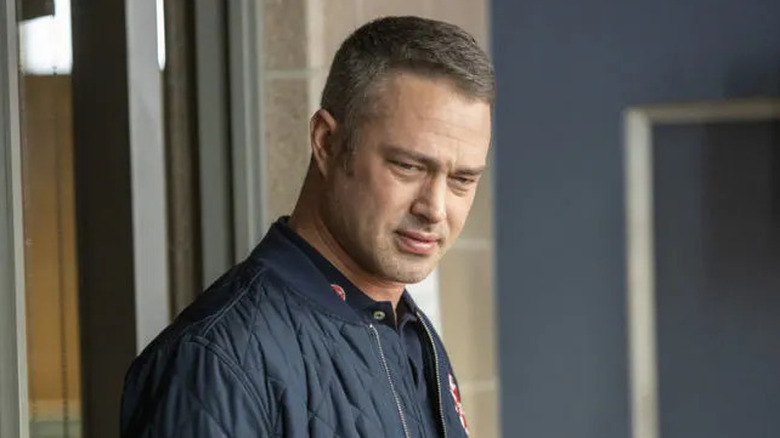Chicago Fire's 12 Worst Episodes Ranked
Since its debut in 2012, "Chicago Fire" has been a staple of NBC's Primetime lineup. Not only has the show proved to be popular with fans, it also spawned the "One Chicago" franchise, which spans four related shows, each with interconnecting characters and plotlines. While one show, "Chicago Justice," lasted only one season, the other three continue to entertain audiences year after year, regularly delivering must-watch television with "Chicago Fire's" best episodes.
"Chicago Fire" has stayed surprisingly strong after all these seasons on the air, with an eleventh on the way. With so many great episodes, characters, and narrative arcs, it can be hard to pick out which episodes are the series' worst. IMDb lists "Chicago's Fire's" lowest-rated episode at a 7.6/10, which for many other shows, might rank among the top. Still, as with any series, some episodes are not as compelling as others, and looking at the ratings, it becomes clear which episodes don't live up to the impressive standards of this long-running hit.
Escape Route (Season 9, Episode 8)
"Escape Route" is a Season 9 episode that primarily deals with a bond that forms between Rescue Squad's Kelly Severide and a teenage boy that he rescues from a fire caused by cheap insulin his parents were storing for his diabetes. The boy happened to be living in the house that Severide grew up in, and in many ways, the boy reminds him of himself. While the coincidences involving Severide's past connections and the boy's struggles are a bit too convenient to be believable, the story between the two hits some strong emotional notes, and overall works well for the character.
Sadly, "Escape Route's" secondary plot doesn't fare quite as well. It involves Captain Matt Casey feuding with a floating firefighter filling in for Herrmann while he's on vacation. The floater, Greg Grainger, is dating Sylvie Brett, who Casey is in love with, and because of that, Casey treats Grainger poorly, yelling at him publicly and berating him for even the most minor mistakes. The drama surrounding the feud over romantic interests is a frustrating plotline that feels childish and out of place on the show.
Blow This Up Somehow (Season 9, Episode 6)
Another Season 9 episode, "Blow This Up Somehow" starts on an extremely compelling note as the Firehouse 51 team is called in to help rescue trapped survivors from a structural collapse at a small gas station. The scene is tense, with multiple people, including a baby, stuck underneath the collapsed structure. With an explosion imminent, Blake Gallo makes a split-second decision to conduct a risky and daring rescue of a trapped woman, almost getting himself killed in the process.
Unfortunately for viewers, the opening is as interesting as things get, as the rest of the episode focuses primarily on a couple that fakes seizures in order to lure paramedics in so they can swap out and steal their fentanyl, replacing it with a vial of a benign substance. After Sylvie Brett and Gianna Mackey nearly lose a patient due to the fake fentanyl, they decide to track down the thieves themselves, leading to hokey and unrealistic story featuring two paramedics trying to do a detective's job. Everything surrounding this story relies far too heavily on dumb luck and blind coincidences that allow the paramedics to succeed in catching the schemers, and stretches the believability of the show too far.
Funny What Things Remind Us (Season 9, Episode 4)
What makes "Chicago Fire" such an excellent show is its focus on impressive emergency rescues and the wonderful camaraderie between the members of Firehouse 51, something that many Season 9 episodes seem to forget. "Funny What Things Remind Us" shifts the show's focus over to the relationship dramas of its leads, particularly between Stella Kidd and Kelly Severide. The issues between them start after Severide is told by a colleague that everyone thinks Kidd only got into the lieutenant's program because of her relationship to him. Instead of discussing the issue with Kidd like an adult, Severide decides he just won't talk to her or see her until after she passes the exam, supposedly making it look like she did everything herself.
The plan, of course, backfires. Stella, who has no idea why Severide is upset with her or why he won't come home for days, just gets more stressed about the exam, eventually deciding to move out. The entire drama is frustrating to watch, as the issues could be solved quite easily if the two would just talk to each other, but instead viewers have to sit by as Severide does everything he can to avoid Kidd while she does her best detective work to figure out why. It doesn't help that Matt Casey and Sylvie Brett are also avoiding each other due to their own romantic feelings, making the episode feel way too soapy.
Then Nick Porter Happened (Season 8, Episode 12)
"Then Nick Porter Happened" has two major plotlines, and neither of them land very well. One story focuses on Nick Porter, a recently divorced friend of Mouch who is in need of a room to rent. Cruz and Sylvie, needing to fill Otis' room following his death in the previous season, agree to let Nick move in, but immediately regret it after he tries to take control of every aspect of the apartment and continually talks about his ex-wife. The story is played primarily for laughs, but instead of being a humorous reprieve from the show's darker elements, the arc feels like bland filler material.
The second story doesn't fare much better. It involves Casey and Severide trying to figure out who keeps pulling the fire alarm at a local private school, creating false alarms and nearly costing a man his life due to resources being tied up at the school. The storyline presents one red herring after another, trying to set up various students Casey and Severide meet with suspicious motives, before ultimately revealing the perpetrator to be a previously unseen younger child who didn't want to attend private school. Because this character isn't introduced prior to being caught at the end, the resolution is deeply unsatisfying. In addition, Casey and Severide convincing the child to draw a picture for the man who nearly died feels oddly insensitive to the man and his family.
The Whole Point of Being Roommates (Season 6, Episode 8)
"The Whole Point of Being Roommates" focuses on "Chicago Fire's" Gabby Dawson, who has a tendency to overstep boundaries. This episode, in particular, highlights that aspect of her character as it builds the relationship between Dawson and a teenage girl she rescued in the previous episode. While the girl, Bria, is in the hospital, Dawson asks her a few questions about her circumstances, and becomes suspicious after Bria is dodgy with her answers.
This is when Dawson really starts to step over the line. She begins following Bria, eventually offering her a ride home to try to find out where she lives. After Bria enters her house, Dawson forces her way inside and discovers that Bria's dad is severely addicted to prescription painkillers, caused by an injury at work. Dawson offers to help Bria, and ends up being called back after the father has a seizure due to the drugs. Dawson tries to help, but Severide ends up calling 911, which starts an investigation into Bria's living situation and causes her to run away. Dawson's reckless disregard for the rules and other people's feelings ends up putting Bria's safety at risk, making "The Whole Point of Being Roommates" an uncomfortable episode to watch.
Forgive You Anything (Season 3, Episode 17)
"Forgive You Anything" is a strange episode of "Chicago Fire" — barely anything even happens in its 40-minute runtime. In fact, the episode would probably be forgotten entirely if it didn't feature a guest appearance from a pre-"Stranger Things" Joe Keery as a teen who Mouch thinks may be his biological son. This doesn't turn out to be the case, and after spending the entire episode tracking him down, he discovers that the teen's younger sister is really his biological child. The sister only makes a brief, non-speaking role at the end, stretching out the plotline as much as possible.
The other main story introduces a friend of Kelly Severide named Scott Rice who was recently hired to work at Firehouse 51. He immediately rubs a few people, including Otis and Mills, the wrong way, and they begin to look for reasons to get him transferred, and Otis begins to fixate on an old report claiming that Rice had thrown a man out of a second story window. At the end of the episode, Severide tells Otis that the report was false, and Rice actually pushed a man through a window in self-defense. In addition, his wife had died that day, making him a single father. The firehouse warms up to Rice, leading the episode full circle.
Keep You Safe (Season 10, Episode 17)
Much like some of the other entries on this list, "Keep You Safe" suffers due to its focus on relationship drama fueled heavily by miscommunication. Paramedic Violet Mikami is secretly dating Paramedic Field Chief Evan Hawkins, but that relationship is put in jeopardy after Hawkins is reprimanded following a report that was filed anonymously claiming he was giving Mikami too much attention and that their relationship was causing problems at work. To their credit, Mikami and Hawkins discuss their options at length, with Hawkins eventually deciding they need to give each other some distance.
However, this causes Mikami to blame her former boyfriend and coworker Gallo, believing him to be the one who filed the report. She blows up at him while at work, only to find out that Gallo didn't file the report — a firefighter at another station had seen them kiss and spread the gossip everywhere, making it impossible to tell who filed it. Luckily, the episode's other story is much more interesting, as it follows Kidd's attempts to get a woman to turn on her abusive boyfriend after he kidnapped a man for money, leading to the man's death. Kidd's previous experience in an abusive relationship makes her empathetic to the woman's struggles, making for an emotional and powerful storyline.
Don't Hang Up (Season 9, Episode 13)
"Don't Hang Up" largely focuses on a plot involving a call Stella Kidd receives from a woman who asks for her by name, and tells her that she's being held against her will and is afraid for her life. Kidd, remaining on the phone, tries to determine who the caller is, and where she's being held. Eventually, the Firehouse 51 team is able to figure out that the caller used to be one of Kidd's Girls On Fire students, and that she and her older brother are being held by members of the gang that her brother used to be involved in.
In many ways, "Don't Hang Up" mirrors the acclaimed episode "911" from "Chicago Fire" producer Dick Wolf's show "Law & Order: Special Victims Unit." Both episodes feature a main character on the phone with a victim being held against their will, while they try to get information about them and their situation. But while "911" is an emotionally powerful episode, "Don't Hang Up" falls short due to a myriad of issues that tank its believability. For example, the constant excuses not to get police involved, keeping the firefighters handling a kidnapping, just don't work. Additionally, Chief Boden ultimately saving the victims by tricking the gang members into leaving the house because it might explode feels like the kind of resolution that an absurdist comedy might use, not a show trying to deal with a heavy subject.
Double Red (Season 9, Episode 9)
"Double Red" opens with Chief Boden rounding up several of the younger members of Firehouse 51, along with the older Mouch, and telling them that they have to rush off to a mandatory training he was only just informed of. The episode primarily centers on Mouch's point of view, as he's the only older firefighter forced to attend the training. During the class, Mouch takes the opportunity to showboat to the junior firefighters rather than completing the drills, and he ends up being the only one in the class not to earn his certification.
While this plotline is played primarily for laughs during the first half of the episode, it pivots to a more serious note when Mouch and Chief Boden have a heart-to-heart about Mouch feeling old and undervalued. This prompts the chief to pull strings and get Mouch certified, despite having never performed or passed the drills. It's a disappointing ending to the storyline, and seeing Mouch get away with not having to pass the tests like everyone else because he's friends with his boss is not the heartwarming buddy storyline the show wants it to be, but rather a disheartening example of favoritism in the workplace.
Smash Therapy (Season 9, Episode 3)
"Smash Therapy" is another Mouch-focused episode, and once again deals with the veteran firefighter feeling inadequate at work following a nearly deadly incident. While performing a rescue, Mouch seemingly forgets to lock the ladder, which throws Matt Casey over the side; luckily, Gallo is close by and manages to pull him up before he falls to the ground. The whole station blames Mouch for making a mistake, with the exception of Herrmann, who does some investigation into the truck.
Initially, the story is promising. Mouch at first blames the truck for malfunctioning, but after several inspections starts to come to terms with the fact that he made a mistake and will have to learn from it. Mouch having to take responsibility for his own mistakes is actually a great arc for him — but then Herrmann discovers that the truck really did have a history of malfunctioning at its previous firehouse, relieving Mouch of any accountability. Unfortunately, this also reverses all the character building that "Smash Therapy" hinted at, and makes the episode ultimately feel pointless.
Pilot (Season 1, Episode 1)
It might seem a bit strange that "Chicago Fire's" first episode, "Pilot," has made it onto the list of worst episodes, especially considering that Season 1 is typically regarded as one of the show's better seasons. But while many television shows' pilot episodes tend to be among their most expensive and well-produced episodes, "Chicago Fire's" premiere struggles with rushed pacing and thin character motivations that aren't really explained until the following episode.
"Pilot" opens with the members of Firehouse 51 responding to a fire that has engulfed a house. The team's efforts to put it out are sadly thwarted when an explosion happens on the second floor, injuring Kelly Severide and killing firefighter Andrew Darden. Darden was close with both Severide and Casey, and his death creates a rift between the two that informs much of Season 1's conflicts between the two leads, who blame each other for the decisions that led to Darden's death. While this should be an emotional hit for viewers, they barely get to know the character before he's killed five minutes into the episode, making much of the conflicts feel unearned, especially between Severide and Darden's widow. "Pilot" and the first season in general could have benefitted greatly from waiting until the end of the episode to introduce Darden's tragic death, giving audiences time to connect with the character before losing him.
The Missing Piece (Season 10, Episode 15)
"The Missing Piece" is "Chicago Fire's" lowest-rated episode on IMDb with a 7.6/10, and while it isn't terrible, its borderline preposterous mystery makes it easily home to one of the show's least believable stories. The episode opens with Severide and the rescue squad being called to help extract a trapped firefighter, recurring character Wendy Seager, from a collapsed structure. After doing some investigating, Seager and Severide realize that the structure was intentionally weakened, setting off the episode's big puzzle.
The two initially blame the building owner, thinking he was trying to commit insurance fraud, but the evidence quickly points to a teenager who had been spotted on site and had a history of arson including intentionally burning his ex-girlfriend's car. It's a pretty run-of-the-mill procedural plot until the teenager's dad reveals that he was behind the incident, and his son was just trying to stop him. The father wanted revenge after his son was convicted of the car fire, making it difficult for him to get a job, so he hatched a convoluted scheme involving luring firefighters to a fire, then weakening the structure to collapse on them and kill them. This supervillain style plot feels really out of place in "Chicago Fire," built more around trying to shock audiences with surprise twists than actually crafting a believable narrative.
